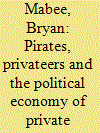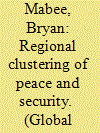|
|
|
Sort Order |
|
|
|
Items / Page
|
|
|
|
|
|
|
| Srl | Item |
| 1 |
ID:
103532


|
|
|
|
|
| Publication |
2011.
|
| Summary/Abstract |
The article develops the insights of historical institutionalism and cognate work within International Relations to examine the development of security institutions within states, dealing specifically with the development of the National Security Council (NSC) in the United States. The case focuses on the creation and reproduction of the NSC as a means to fostering civil-military coordination within the US state. The article argues that exogenous shocks are crucial in providing the necessary freedom to change existing institutions, which are then set on new contingent paths. Substantively, it is argued that World War II and the experiences derived from it provided a critical juncture for the creation of new security institutions such as the NSC, and once created the NSC was characterized by forms of path dependence that have reproduced the institution over time. The article demonstrates how historical institutionalism can clarify causal mechanisms that better explain the origins and durability of internationally oriented security institutions within states.
|
|
|
|
|
|
|
|
|
|
|
|
|
|
|
|
| 2 |
ID:
077896


|
|
|
|
|
| Publication |
2007.
|
| Summary/Abstract |
The historical sociology of international relations is becoming an increasingly prominent field of enquiry. While advocates of an international historical sociology (IHS) have delivered a range of outstanding contributions, they have tended to revolve around the macro-scale, dealing with sweeping grand themes such as the nature of civilizations, the creation of world order, the advent of modernity, and the purpose and formation of the state. This article makes the case for incorporating micro-historical sociological analysis into IHS as a means of complementing already existing analyses, and providing a more rounded field of enquiry. The article argues that the micro-macro issue is an analytic strategy rather than an ontological choice, illustrating this point through a historical institutionalist variant of foreign policy analysis
|
|
|
|
|
|
|
|
|
|
|
|
|
|
|
|
| 3 |
ID:
088900


|
|
|
|
|
| Publication |
2009.
|
| Summary/Abstract |
Historical accounts of private violence in international relations are often rather under-theorised and under-contextualised. Overall, private violence historically needs to be seen in the context of the relationship between state-building, political economy and violence, rather than through the narrative of states gradually monopolising violence. Pirates and privateers in late-seventeenth and early-eighteenth century Europe were embedded in a broader political economy of violence which needed and actively promoted 'private' violence in a broader pursuit of power. As such, the de-legitimatisation of piracy and privateering were the consequence of a number of interlinked political economic trends, such as the development of public protection of merchant shipping (through the growth of centralised navies), the move away from trade monopolies to inter-imperial trade, and the development of capitalism and industrialism. Present forms of private violence also need to be seen as part of a broader historical dynamic of war, violence and political economy.
|
|
|
|
|
|
|
|
|
|
|
|
|
|
|
|
| 4 |
ID:
088901


|
|
|
|
|
| Publication |
2009.
|
| Summary/Abstract |
The aim of this article is to comprehend how peace and security cluster at the regional level. In a globalized and interconnected world, each polity engages in a wide range of different relationships with other polities. Peace and security embody one of these relationships, since to feel secure or to be in peace entails managing a relationship with the 'other'. This article is divided in three parts. First, it briefly assesses classical theories of regional security in order to detect some of their shortcomings and to propose an alternative path. Second, it breaks down the concept of regional security in order to pinpoint two different (albeit sequential) empirical manifestations of regional security: regional violence-insecurity and regional peace-security. This dichotomy is associated to the passive and active components of peace and security. Third, the article describes the different paths that lead to the regionalization of peace and security (in its dual dimension).
|
|
|
|
|
|
|
|
|
|
|
|
|
|
|
|
| 5 |
ID:
157924


|
|
|
|
|
| Summary/Abstract |
Militarism – a mercurial, endlessly contested concept – is experiencing a renaissance of sorts in many corners of the social science community. In critical security studies, the concept’s purview has become increasingly limited by an abiding theoretical and analytical focus on various practices of securitization. We argue that there is a need to clarify the logic and stakes of different forms of militarism. Critical security scholars have provided valuable insights into the conditions of ‘exceptionalist militarism’. However, if we accept that militarism and the production of security are co-constitutive, then there is every reason to consider different manifestations of militarism, their historical trajectories and their interrelationships. To that end, we draw on the work of historical sociologists and articulate three more ideal types of militarism: nation-state militarism, civil society militarism and neoliberal militarism. We suggest this typology can more adequately capture key transformations of militarism in the modern period as well as inform further research on the militarism–security nexus.
|
|
|
|
|
|
|
|
|
|
|
|
|
|
|
|
|
|
|
|
|